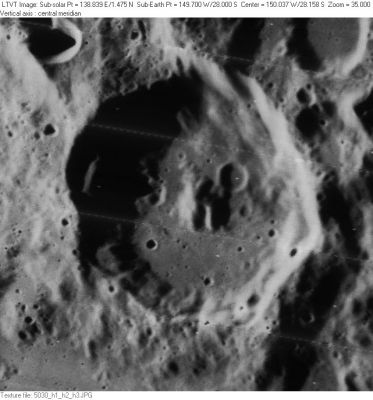Difference between revisions of "Barringer"
| Line 5: | Line 5: | ||
|} | |} | ||
<div id="toc"> | <div id="toc"> | ||
| − | + | [http://www.lpod.org/coppermine/albums/userpics/Barringer_LO-V-030H_LTVT.JPG [[Image:normal_Barringer_LO-V-030H_LTVT.JPG|external image normal_Barringer_LO-V-030H_LTVT.JPG]]]<br /> ''[http://lpod.org/coppermine/displayimage.php?pos=-3071 LO-V-030H]'' '''Barringer''' is on the north rim of the [http://the-moon.us/wiki/Apollo Apollo] impact basin. The 19-km diameter crater partially visible in the upper right corner is '''Barringer C'''. The remainder of the features are unnamed.<br /> <br /> | |
| − | |||
==Images== | ==Images== | ||
[http://www.lpod.org/coppermine/thumbnails.php?album=search&type=full&search=Barringer LPOD Photo Gallery] [http://www.lpi.usra.edu/resources/lunar_orbiter/bin/srch_nam.shtml?Barringer%7C0 Lunar Orbiter Images] [http://www.lpi.usra.edu/resources/apollo/search/feature/?feature=Barringer Apollo Images]<br /> | [http://www.lpod.org/coppermine/thumbnails.php?album=search&type=full&search=Barringer LPOD Photo Gallery] [http://www.lpi.usra.edu/resources/lunar_orbiter/bin/srch_nam.shtml?Barringer%7C0 Lunar Orbiter Images] [http://www.lpi.usra.edu/resources/apollo/search/feature/?feature=Barringer Apollo Images]<br /> | ||
| Line 20: | Line 19: | ||
==Additional Information== | ==Additional Information== | ||
| − | * From the shadows in LO-V-030H, the west rim of '''Barringer''' is 3700-5100 m above the floor. The central peak is at least 1950 m tall. <span class="membersnap">- | + | * From the shadows in LO-V-030H, the west rim of '''Barringer''' is 3700-5100 m above the floor. The central peak is at least 1950 m tall. <span class="membersnap">- Jim Mosher</span> |
* [http://the-moon.us/wiki/Central%20peak%20composition Central peak composition]: GNTA1 & GNTA2 ([http://the-moon.us/wiki/Tompkins%20%26%20Pieters%2C%201999 Tompkins & Pieters, 1999]) | * [http://the-moon.us/wiki/Central%20peak%20composition Central peak composition]: GNTA1 & GNTA2 ([http://the-moon.us/wiki/Tompkins%20%26%20Pieters%2C%201999 Tompkins & Pieters, 1999]) | ||
<br /> | <br /> | ||
| Line 37: | Line 36: | ||
---- | ---- | ||
| − | + | </div> | |
Revision as of 16:14, 15 April 2018
Contents
Barringer
| Lat: 28.0°S, Long: 149.7°W, Diam: 68 km, Depth: km, Rükl: (farside) |
LO-V-030H Barringer is on the north rim of the Apollo impact basin. The 19-km diameter crater partially visible in the upper right corner is Barringer C. The remainder of the features are unnamed.
Images
LPOD Photo Gallery Lunar Orbiter Images Apollo Images
- Frame 31, made by Zond 8, shows Barringer near the frame's lower right corner. Barringer is the pronounced crater with central peak.
- Research: Danny Caes
Maps
(LAC zone 106D4) USGS Digital Atlas PDF
Description
Description: Wikipedia
Additional Information
- From the shadows in LO-V-030H, the west rim of Barringer is 3700-5100 m above the floor. The central peak is at least 1950 m tall. - Jim Mosher
- Central peak composition: GNTA1 & GNTA2 (Tompkins & Pieters, 1999)
Nomenclature
- Named for Daniel Moreau Barringer (1860-1929) an American engineer and geologist. Barringer is best known for his persistent arguments that what is now known as Meteor (or Barringer) Crater in Arizona (but then known as Coon Butte) was caused by the impact of an iron metorite and his attempts to exploit the site commercially. Barringer's conclusions contradicted those of the eminent American geologist G. K. Gilbert, who was, ironically, an early advocate of the impact theory of lunar cratering.
LPOD Articles
Bibliography
About Daniel Moreau Barringer and the Barringer crater:
- THE FALLEN SKY; An Intimate History Of Shooting Stars (Christopher Cokinos, Tarcher/Penguin, 2009).
Daniel Moreau Barringer in the Sourcebook Project (William R. Corliss)
- In Rare Halos, Mirages, Anomalous Rainbows, and related electromagnetic phenomena (1984) :
- GEL1-R23: Note on the 'Green Flash' (D. Moreau Barringer, Popular Astronomy, 1949). GEL1: Puzzling Features of the Green Flash.
